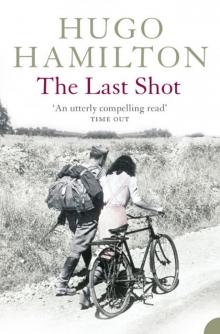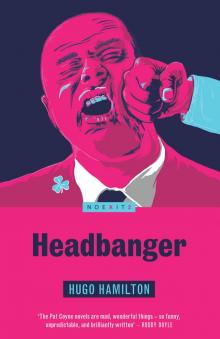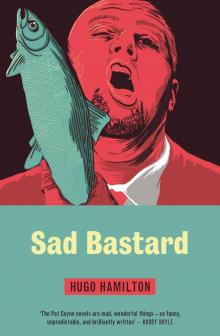- Home
- Hugo Hamilton
The Last Shot Page 5
The Last Shot Read online
Page 5
I began to talk about my trip to Prague. I told her how I had found a restaurant there with a bar of soap chained to the sink in the wash-room. And how the restaurant served a variety of dishes, including liver soup and a dish called ‘Ovary’. I took out a present of a Czech tube of toothpaste which I said I had bought especially for her. It was as hard as a metal bar. Normally Anke would have laughed at that. She said nothing. She looked at the toothpaste and then placed it on the table beside her coffee.
‘What’s wrong?’ I asked.
Anke started crying. She cried to herself almost. As though she was alone.
What struck me as remarkable was that Anke never moved. She didn’t move her hands to stop the tears. She stayed sitting back, legs crossed, arms languishing over the armrests, allowing the tears to run down her face as though it was perfectly normal. It was as though there was nobody around. Then she began to explain quite rationally that there was something wrong with the baby.
‘Alexander has Down’s Syndrome,’ she said, making the first effort to remove the tears with a finger. Finally, she took a Kleenex from her bag.
I said I was sorry. I took her hand and said it again. I could think of nothing else to say. At the table next to us, there were two old women who kept looking at Anke. One of them had one of those little Spitz dogs tied on a lead to the leg of the table. He too was looking up at us, and when I looked back at him, he barked. I felt like kicking him.
I asked questions. Said some more ineffectual things and told Anke not to blame herself. She seemed not to hear me. She asked if these things usually skip a generation or what? I had no answer. I eventually took her back to her car and watched her drive away, crying.
Jürgen rang me a day later with a complete medical analysis. He could cope with it better. He was used to it as a doctor, as a gynaecologist. He told me straight out, there was no logic to it. But they would care for Alexander like any other child. No question. They would love him all the more.
Then he announced that Anke and himself had decided to move to Münster, where he was going to take over his father’s practice. It seemed like the right decision.
A month later, they were gone.
12
The trains still ran in the Reich. Through the latter part of the war, Bertha Sommer got to see every part of Germany from the windows of a train, travelling from one post to the next, hoping, like most other German girls, to avoid being sent to the Eastern Front. At one point, Bertha managed to feign an illness which kept her at home for some months. Late in 1944, when she could no longer get away with it, she was sent to a large camp outside Hamburg where thousands of young German women waited to be posted, mostly to Poland and Russia. Rumours went around that women had to dig the trenches. In Russia, the German girls were already knee-deep in mud.
Bertha was lucky, so far. It was God on her side. She delayed wherever she could. In December 1944 she stretched her Christmas leave and arrived two days late in Salzburg to find that her group had already departed for the East. Her name was on the missing list. She met with the anger of officers who didn’t know what to do with her and was eventually sent to Prague on New Year’s Eve.
There was frost everywhere. The journey continued in the afternoon, when Bertha was put on a train and placed in a compartment with a young soldier. The compartment was locked. There was no heating on. She had disobeyed the orders of the Reich and could only expect the worst.
It was only when the train had been rolling for a while through the white land that she looked around her and discovered that the soldier with her in the compartment was no more than fifteen or sixteen. He was chained to the seat. A deserter. It made her feel like a deserter too. During the entire journey, neither of them spoke a word, each fearing that the other was an informer, or that a normal conversation would combine them in some conspiracy. Bertha was afraid.
‘What did we imagine?’ she later wrote in her diary. ‘Our fears were simple and absolute…
‘Every time I wanted to go to the bathroom I had to call the guard to unlock the door. It made me feel like a criminal. Every time the boy had to go, they unlocked his chains and went with him. Were they afraid he would throw himself off the train? He was so young. He had just begun to grow a moustache. The whole idea was so idiotic. The effort to get this boy back to the Front took up the full attention of three grown-up soldiers.’
Somewhere along the way, at a small station in the mountains, the train stopped for a long time, at least an hour. There were trees all round, heavy bags of snow weighing on the branches. When the train moved on slowly, they moved past a timber-yard at the back of the station where Bertha saw something she never forgot.
She looked away at first and couldn’t believe it. Then she looked again before the train moved along behind a large timber-shed and straight into the woods again. There in the yard she had seen three men hanging from an improvised scaffold. She saw them long enough to believe it. Their bodies were limp. Their heads hung down as though they were asleep or something. They wore civilian clothes and had cardboard signs around their necks. Some soldiers stood around the yard, looking on. Smoking. Or maybe it was their breath. There was no breath from the men hanging.
It was the only time that Bertha’s eyes fully met those of the recruit in the carriage with her. He had obviously seen it too, and a stark acknowledgement flashed between them until they remembered their own situation and ignored the brief contact again.
Bertha could not help thinking about it as the train rocked along through the white landscape, through a German fairytale. Had they done that for Germany? For her? All the time, as the train sped on towards Prague, she kept repeating her own secret name for that day in her mind. The Timber-yard of silent breath. With a combination of fury and fear, she repeated the title in her head like a lullaby, trying to keep a nightmare away. Later, she changed it again. It became: the Timber-yard of breath.
The journey took sixteen hours. For a long time, she was unable to eat the sandwiches she had brought with her. She felt sick. She was also afraid to share her food with the nameless soldier in her compartment. Only when it was dark did she decide to eat furtively, avoiding any eye contact. She ate alone, chewing quietly. The food soon gave her a warm feeling. But it felt all wrong. In the dark, she leaned over and placed a sandwich made of black bread and cheese on the seat beside the soldier. The boy took the sandwich without a word. Their silent chewing was like a coded conversation.
The train arrived in Prague early in the morning on New Year’s Day. The boy was led away, handcuffed to another soldier.
At the time, Bertha’s own luck seemed more important to her. But in the subsequent months while she was stationed in Laun, it played on her mind. The men hanging. And the young soldier chained to the seat. She should have spoken to him. Asked his name. Encouraged him. Memorized his address so that she could send word to his mother for him. But there were always other things which took over. Other personal fears.
‘We were all fed on fear,’ she wrote in her diary.
13
I kept in touch with Anke and Jürgen. On the rare occasions that they came back to Düusseldorf on a weekend, they came to visit me. Once every two years only. We would spend the night out in a restaurant talking, drinking. We kept in touch by post mainly. Or by phone. Every year I sent a gift for Alexander on his birthday: 1 October. And Anke would write me a short, impulsive letter back just to let me know they were alive. If I didn’t get a letter I could expect a call sooner or later.
They were very happy in Münster. Jürgen was doing extremely well in his father’s practice. Though Anke sometimes complained that she didn’t see enough of him. And occasionally, she hinted that she would like to be back in her city for a while. But Jürgen would never move back to Düsseldorf. Anyway, it was out of the question because of the new practice.
Once, Anke sent a photograph of herself and Alexander to keep me up to date. She hadn’t changed a bit. Though I would not have said t
hat in a letter. My letters were strictly neutral. They were addressed to both Jürgen and Anke, usually in that order. The kind of neutral letters which are read out over the breakfast table before they collect jam stains. This is one of her letters. It was sent when Alexander was three years old. Far from neutral, I thought.
Got your present for Alex, thank you very much. Though I don’t quite know what he is going to do with it. All toys eventually drive us mad because it only reminds us of his limitations. A toy is like a test to a child’s limits. The joy that most parents get is watching their children break down those limits. Jürgen and I, we have to make exceptions for everything. Of course I’m very grateful that you remember Alexander’s birthday like this every year. Sometimes I get the urge to talk to somebody else about our life, somebody outside the family, somebody not directly involved…
Anke had never said anything like this to me about Alexander’s difficulties before. She would never even refer to his having Down’s Syndrome. She had told me that Alexander was going to a special school, and occasionally described his retardation and lack of progress on the phone when I asked her, but she always painted a picture of extreme patience. I would never have thought she was anything less than completely happy. It came as a total surprise. The letter ended like this:
Sometimes I want to be back in Düsseldorf. Or in the Eifel. I think about you. I think about my other life.
Anke
14
On 6 May, the German Army was still in occupation at Laun. And they still occupied the protectorate of Czechoslovakia. By a thread.
Overnight, German planes had flown over the capital of Prague raining down leaflets appealing to the inhabitants to submit, or pay for it in blood. The leaflets promised that no Czech would be harmed and that the German Army wished only to engage the real enemy: the Red Army. Later on, the same planes flew over Prague again with a more persuasive message: phosphor bombs. SS units with tanks approached from the south to regain control of the city, following orders literally: ‘the whole nest has to burn’.
In Laun, the German Wehrmacht training garrison became actively involved in the war for the first time. Early that morning, local observers from the town posted to watch the garrison overnight came back to report to the committee at the U Somolu pub that large troop movements were seen leaving in the direction of Hriskov. At least six or seven trucks full of soldiers. There was nothing the committee could do but warn the people at Hriskov by phone. Nothing Laun could do but wait.
Bertha Sommer had not been up to see Hauptmann Selders give the order to send out troops. She arrived to find the office in a frenzy of activity. She was there in time to see the trucks leaving; in time to feel a futile compassion for all those young recruits heading in the direction of the fighting. South. East. Into the hands of the Red Army.
Bertha had given up her own final chance to escape the end. But instead of becoming dismal, she decided to become useful. She took up the task of keeping in touch with other garrisons around Bohemia, to see what their information was. Garrisons like Trutnov, which had also taken a stand against the Czechs with hostages.
It became clear by now that Officer Franz Kern had begun to play the most important role of all. As radio engineer, he was the lifeline to the outer world. Every twenty minutes, he appeared in the office with fresh news. Reports from Prague or from Moscow; sometimes even as far away as London.
Bertha had not spoken to him since their escape failed. She wanted to catch his eye, to get some acknowledgement. She wanted to let him know that she had tried to escape with him the night before. It was the rain. She wanted him to know that she had not informed on him. But Officer Kern seemed too preoccupied. Their eyes met only in passing. There was no communication between them. No signal.
When she eventually found an excuse to go out into the corridor, she was hoping to catch him and speak to him briefly. With the Third Reich collapsing around them, she invented a reason to meet him alone for a moment, but he would not let her speak. He placed his index finger over his lips. He didn’t want to hear.
‘I know,’ was all he said.
That was enough for Bertha. What it was he knew wasn’t clear. But he must have known that she had not betrayed him. She went back to her work.
During the day, the activity in the office intensified apace with the war outside. There was talk of capitulation. But General Schörner wanted more valour and sent out personal messages to his men over the radio: ‘Soldiers. You must break every resistance from the Czechs with the heaviest weapons.’
Very soon after that, Officer Kern came back into the office with another message, this time broadcast by the free Czech radio. It had been put out repeatedly in three different languages: ‘Prague calling. Here is free Prague. Red Army – send help. We need tanks and planes. Don’t let us go down in a useless struggle. Help, quick, quick, quick.’
It is significant that Prague began to call on the Russians, instead of the Americans, who had been closer to Prague for days. At one point, a report broadcast by the BBC in London said that the American Army at Pilsen had begun to move on Prague. But the report was misleading. Nothing could lure the Americans to get involved in what had already become a Soviet state.
For the Germans, it meant that all hope of surrendering to the Americans had faded. Second best, they would have to surrender to the Russians.
15
That evening, straight after dinner, Bertha Sommer went to her room to rest. There was nothing she could do at the office any more. She took her washbag and towel and went to the washrooms on her landing to wash her hair, and after that her feet. She had just got back to her room when she heard footsteps in the corridor outside her door. She could hear a knock on the room next door which she knew to be unoccupied. She stopped combing her hair and listened. When there was no answer, the footsteps came and approached her own door. She waited for the knock and then went to answer it, opening up a little so that only her face could be seen around the door. It was Officer Kern.
‘Ah, Fräulein Sommer. I didn’t know which room was yours. I’ve got to speak to you for a moment.’
She didn’t know whether this was an order or a request. This was not a good idea, his coming to her room, she thought. She looked past him to see if there was anyone else in the corridor. But the building had been largely empty since the civilian population moved out. Her hair was wet and she stood there feeling awkward in her dressing-gown and slippers, waiting for him to speak. She was glad at last to be able to explain to him what happened the night before, but felt it wouldn’t be right to invite him inside.
‘I’m afraid we might be overheard in the corridor,’ he said. ‘I won’t stay long, Fräulein Sommer, I promise.’ He understood her reluctance.
‘Wait. Let me get dressed.’
He stood outside and heard her moving around inside the room. As soon as he heard the sound of clothes, he began to pace up and down to give her complete privacy. Bertha checked herself in the mirror and considered the implications of letting a man into her room. The war is a time for exceptions. She looked around to make sure that the room was tidy and reminded herself not to speak too soon. Let him speak first, she said to herself.
‘Forgive me, Fräulein Sommer,’ Kern said as he entered the room. ‘But I felt I had to speak to you. What happened last night doesn’t matter.’
‘I tried to go,’ she broke in, already disregarding her own first rule.
‘I know,’ he replied. ‘I saw you. I saw you turn back. You were right. There was no other way. I was worried that somebody else might have seen you too. Now I’m sure nobody did.’
‘I saw the Red Cross vehicle leave.’
‘Yes,’ Officer Kern said. ‘It doesn’t matter. What happens now is more important. It is too dangerous to make any new plans to escape. We should wait for a ceasefire and hope for the best. I know the Red Army is approaching from the north. They’re not far away. But our best bet is to stay. The hostages here give us some
protection.’
Bertha was taken aback by the way Officer Kern included her so presumptuously in his plans. At the same time it reassured her. There was something she wanted to ask him, but she had forgotten what. She let him speak.
‘There is great hostility against the Germans. I’ve heard reports from London about…terrible things. About the Jews in the camps. I thought it was all propaganda at first. But now, I’m beginning to believe it. No imagination could invent what they’re saying about us.’
Officer Kern checked himself. It was not something he wanted to talk about. He had listened to the radio too much.
‘I’m sorry. Fräulein Sommer, the last thing I want is to alarm you, but when this war is over, even when the ceasefire is called, I know the Russians won’t stop. They will overrun all of Czechoslovakia and take as many of the German troops as possible. Hauptmann Selders is playing a clever game with the hostages. Maybe that will save us. But after that, it’s every man for himself.’
Officer Kern spoke as though he had seen everything happen before.
‘Fräulein Sommer, I want you to know that the bicycle is at your disposal.’
Bertha laughed. Maybe it was a nervous laugh. She felt she had done him an injustice, and tried to be serious. But the idea of fleeing from the Russians on a bicycle seemed too funny. Officer Kern smiled.
‘I’m sorry,’ Bertha said. ‘I’m only laughing at the idea of trying to escape on a bicycle.’
‘Believe me, Fräulein Sommer, when this war is over, the roads from here to Kempen will be so stuffed with people, nothing will move faster than a tortoise. In fact, it is my guess that the bicycle will be the fastest mode of transport. Believe me, when they call a ceasefire, every cart with wheels left on it will be out there going home.’

 Dublin Palms
Dublin Palms The Pages
The Pages The Sailor in the Wardrobe
The Sailor in the Wardrobe Every Single Minute
Every Single Minute Hand in the Fire
Hand in the Fire The Last Shot
The Last Shot Disguise
Disguise Headbanger
Headbanger Sad Bastard
Sad Bastard The Speckled People
The Speckled People